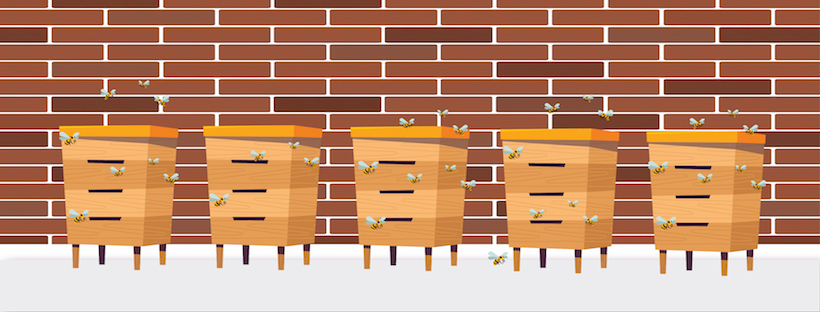By: Jen Costa, Parks Services Assistant

Did you know honey bees are not native to North America? They were imported from Europe in the 17th century to make honey and pollinate crops. Without bees, our diets would be dull, tasteless and less nutritious. Bees pollinate 80% of the world’s plants by pollinating fruits, nuts and vegetables. One out of every three to four bites of food that we consume are because of bees.
250,000 species of flowering plants depend on pollen transfer to survive. A single colony of bees can pollinate 300 million flowers each day, gather 40 pounds of pollen and 265 pounds of nectar. Honey bees also produce…you got it, honey! Raw honey is the only food we consume that does not need to be pasteurized. Raw honey can fight infections, soothe sore throats, suppress coughs and is a good source of antioxidants.
The bee population has declined since the 1980’s due to a variety of factors including pesticides, drought, nutrition deficit, air pollution and parasitic mites. The Park District of Franklin Park is involved in protecting these amazing creatures. The Park District installed five beehives on the Centre of North Park’s rooftop. They help preserve the bee population in a controlled environment.

The beehives are regularly inspected to ensure they are healthy, mite free and the queen bee is laying eggs. The queen can lay 1,500-2,000 eggs a day! The five rooftop beehives each contain approximately 10,000 Italian bees, which is a total of 50,000 bees.The Italian bees are the first domesticated bee brought to North America. They are gentle, less defensive, less prone to disease and excellent honey producers.
Honey bees are not the only pollinators. There’s also butterflies, moths, birds, bats and much more. The Park District of Franklin Park aims to help all pollinators. We are planting more pollinator plants like salvia, geraniums, lavender, bee balm, milkweed, phlox, and echinacea in our parks.
When you decide to spray a pesticide, fungicide, herbicide or insecticide on your property, please remember our honey bee and pollinator friends. Your decision could help or harm the declining populations.

